 | « Back to article | Print this article |
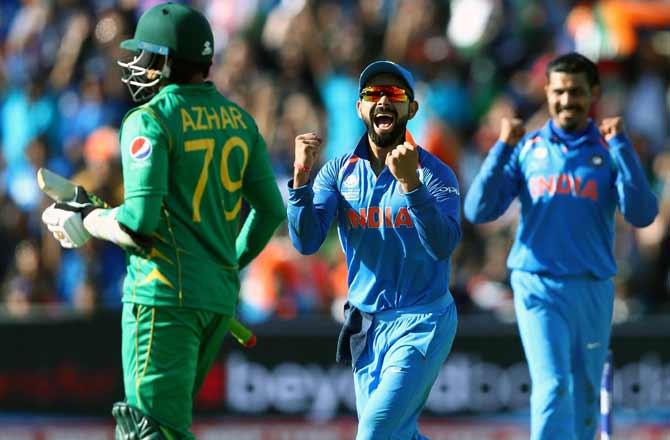
The mother of all cricketing battles will take place in Manchester on Sunday, June 16, when arch-rivals India and Pakistan clash in the World Cup at Old Trafford.
India, who have made a confident start to the World Cup, are favourites not only for the Pakistan game, but also the title.
On the other hand, Pakistan started with a crushing defeat against the West Indies, but bounced back strongly to upset hosts England.
A well-drilled India, led by run-machine Virat Kohli, will look to extend their World Cup winning run against Pakistan who are yet to register a victory in six attempts.
Rajneesh Gupta lists how India has dominated Pakistan in World Cup games:
Sydney, 1992: India won by 43 runs
Seventeen years after the inception of the World Cup, India and Pakistan faced each other for the first time at Sydney on March 4, 1992.
India dropped Ravi Shastri and asked Ajay Jadeja to open. Jadeja played well for his 46, but the finest innings came from Sachin Tendulkar with an unbeaten 54 from 62 balls. Sachin put on 60 in 8 overs with Kapil Dev.
India ended with 216/7 in 49 overs -- an over was reduced due to Pakistan's slow over rate.
Pakistan lost two quick wickets, but opener Aamir Sohail and Javed Miandad steadied the innings.
Miandad was involved in a war of words with wicket-keeper Kiran More and mockingly mimicked More's appealing style by leaping up and down.
More had the better of the cricketing contest, with two catches, a stumping and Imran Khan's run-out.
Miandad took 34 overs to score 40, leaving his colleagues with a tall order. Pakistani wickets kept tumbling at regular intervals and Pakistan were dismissed for 173 in the last over, giving India victory by 43 runs.
Bengaluru, 1996: India won by 39 runs
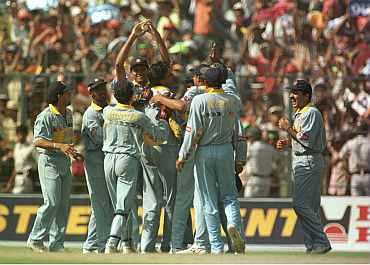
Bengaluru's first floodlit game coincided with the first meeting of these teams on Indian soil for six-and-a-half years.
And it was a crucial game -- the World Cup quarter-final.
The match inspired high passions across the two nations even before it started. And what happened on the ground was nerve-shattering.
The Indians could not believe their eyes when Aamir Sohail came out for the toss instead of Wasim Akram who had ruptured a side muscle.
The conspiracy theorists speculated that Akram may have withdrawn deliberately from the contest, a charge the great left-arm bowler furiously denied.
India chose to bat and though Pakistan could not make a breakthrough until the 22nd over, scoring runs was not easy.
Waqar Younis bowled a fiery first spell and Sachin Tendulkar looked ordinary.
Sachin was the first to go, bowled off an inside edge. Navjot Singh Sidhu then took the centrestage. He used his feet against the spinners to good effect and kept scoring at a good pace.
Despite an injury and employing a runner, Sidhu scored 93 before he failed to read a flipper from Mushtaq Ahmed and was bowled.
The scoreboard read an impressive 168/3, but the scoring rate was barely 4.5 runs per over.
The scoreboard kept ticking after Sidhu's dismissal with useful contributions from Mohammad Azharuddin and Vinod Kambli, but there was no spark in the innings until Ajay Jadeja came out to bat.
He hit three consecutive fours and a six from Waqar's 9th over that eventually went for 22 runs. Waqar was hit for another 18 runs in his last over.
The only consolation for the bowler was that he dismissed Jadeja, which gave him his 200th wicket in one-day internationals.
Jadeja had by then scored 45 in 25 balls. India had scored 51 from the last 3 overs, with Waqar giving away 40 runs in two after his first 8 had cost just 27.
A slow over rate was punished by the deduction of an over from Pakistan's reply, the only such penalty in the 1996 tournament. India ended with an impressive 287/8.
The way openers Aamir Sohail and Saeed Anwar batted, it seemed Pakistan would chase down the target with plenty to spare.
Anwar scored 48 from 32 balls, including 2 sixes, before he skied to Anil Kumble. Stand-in captain Sohail was cruising along though. However, his antics got the better of him.
After hitting a boundary off Venkatesh Prasad, he gestured at the bowler, probably telling him where he would dispatch his next ball. Prasad disturbed Sohail's furniture off the very next ball and furiously showed him where the pavilion was.
Prasad grabbed two more wickets and the asking rate started increasing.
Rashid Latif, with two big sixes in a run-a-ball 26, kept Pakistan going, but his stumping sparked a collapse.
When Javed Miandad was run out, the result became inevitable.
India won by 39 runs. Angry fans in Pakistan burned Akram's effigy. One Pakistani fan reportedly shot his television set and then himself. Miandad announced his retirement one final time.
Manchester, 1999: India won by 47 runs
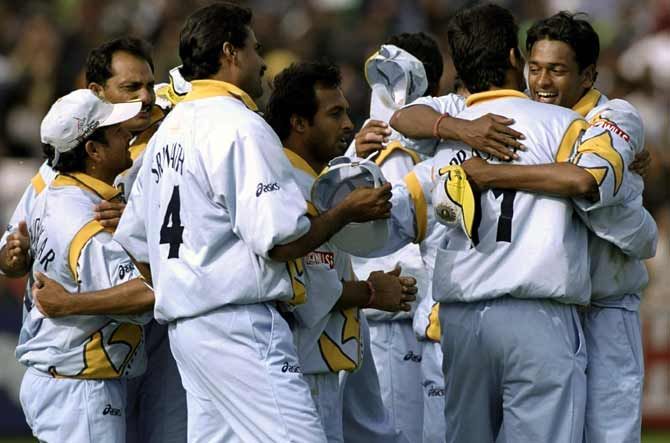
The game was played as Indian and Pakistani soldiers were engaged in battle in the Kargil heights, so emotions ran high.
Security was intense at Old Trafford as rival fans created a passionate atmosphere unimaginable in English cricket.
The cricket itself did not match the passions visible in the gallery. Mohammad Azharuddin won the toss and elected to bat.
The outfield sodden from heavy overnight rain made stroke-making difficult, but that did not deter Sachin Tendulkar from blazing albeit briefly.
Once Sachin was dismissed -- caught at deep mid-off playing an over ambitious drive against Azhar Mahmood -- the Indian innings lost its punch. Only two boundaries were struck between the 21st and 45th overs as Rahul Dravid lost momentum.
Azharuddin and Robin Singh added some quick runs towards the end as India finished at 227/6.
Saeed Anwar pulled Javagal Srinath's first ball to the boundary, giving an impression that the chase was going to be a straightforward one.
However, Srinath first had Shahid Afridi caught in the gully and then induced an edge from Ejaz Ahmed to second slip.
From there on, Venkatesh Prasad took over. First, he trapped Salim Malik lbw and then got Saeed Anwar caught in the slips. Azhar Mahmood followed soon.
Inzamam-ul Haq and Moin Khan tried to steady the innings, but Moin -- after hitting Robin Singh for a six -- top edged a pull, giving Prasad his third wicket.
Inzamam and Abdul Razzaq held fort for few more overs before Razzaq was bowled by Srinath.
With the required run-rate getting steep, Inzamam had no option but to try something different. His attempted swing across the line at Prasad trapped him plumb in front.
The Pakistan innings ended with Wasim Akram's dismissal. He was caught on the square-leg boundary and Prasad had a fifer.
Centurion, 2003: India won by 6 wickets
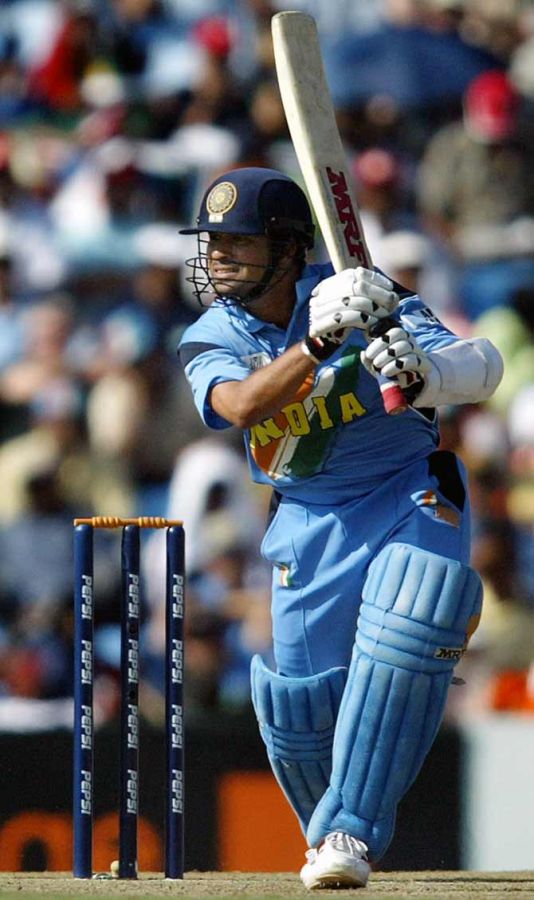
On a hot day and before a packed stadium, Sachin Tendulkar played an innings which is now part of cricket folklore.
India and Pakistan were playing each other after three years and the teams produced a sizzling contest.
Pakistan were given a solid start by Saeed Anwar and Taufeeq Umar. Anwar was in his zone and although wickets kept falling around him, he had no difficulty in working the ball with his wristy shots.
In the process, Anwar completed 2,000 runs against India in ODIs and reached his 20th ODI hundred. His innings was finally ended by an excellent yorker from Ashish Nehra. Anwar's innings had only seven fours, but it was a pleasure to watch him bat.
Useful contributions from Younis Khan, Rashid Latif and Wasim Akram meant Pakistan finished at a respectable 273/7.
India had never chased down a target in excess of 230 in the World Cup.
Chasing 274 against a bowling attack comprising Wasim Akram, Waqar Younis, Shoaib Akhtar and Abdul Razzaq looked a monumental task. But Tendulkar showed he was the man for the occasion.
Normally content to let his opening partner take strike, Tendulkar told Virender Sehwag that he would face the first ball, as if to prove a point.
The point was made very soon when he incredibly upper-cut Shoaib Akhtar, sending the ball several rows back from the deep point fence.
That stroke was followed by a sumptuous pull and a drive down the ground for fours. Shoaib went for 18 runs in his first over and was relieved by Waqar.
The stage had been set for India's magnificent chase.
Sehwag joined the fun and sent Waqar's first ball over deep cover-point into the crowd. It was breathtaking stuff as India zoomed to 53 for no loss in the 6th over.
Waqar then dismissed Sehwag and handed a first-ball duck to Sourav Ganguly. Promoted to bat higher, Mohammad Kaif survived the hat-trick ball and then played a sensible knock as Tendulkar mastered the bowling.
In the 10th over he reached his 50 off just 37 balls. With Tendulkar in superb touch, all Kaif needed to do was rotate the strike, which he did.
Tendulkar's dazzling array of strokes kept the jam-packed stadium enthralled. When he reached 83, he completed 12,000 ODI runs.
A short time later, Sachin and Kaif reached their century stand from 81 balls. After Kaif dragged one on from Shaheed Afridi, India had scored 155/3 in the 22nd over.
Only 119 runs were needed in 28 overs, which looked like a walk in the park.
The circumstances were conducive to Rahul Dravid's style of batting. Tendulkar, in the meanwhile, was struggling with cramps in the searing heat. After some stretching, he continued with the help of a runner.
Shoaib, sensing a hint of vulnerability, bowled a vicious delivery that reared up a good length. Tendulkar was unable to fend the ball to the ground and his magnificent innings ended just 2 short of a well-deserved hundred.
With the required run rate under control, Yuvraj Singh played an attractive innings of 50 not out off 53 balls and together with Dravid took India home without much fuss, with 26 balls to spare.
Mohali, 2011: India won by 29 runs
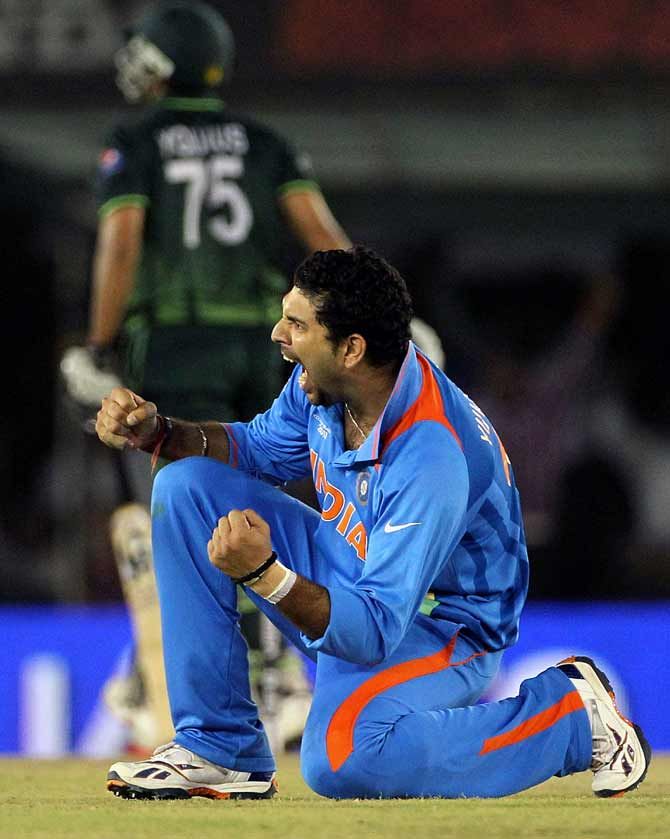
Mahendra Singh Dhoni had no hesitation in batting first after winning the toss. Virender Sehwag started in usual fashion, hitting a boundary off the very first ball, but it was Sachin Tendulkar who soon took centrestage for a different reason.
Tendulkar survived two very tight calls on 23: The Mohali crowd was stunned when Umpire Ian Gould upheld Saeed Ajmal's lbw appeal against him. Technology saved Tendulkar, a staunch critic of the DRS, as the replays showed that the ball would have narrowly missed the leg stump.
Perhaps shaken by his narrow escape, he was nearly stumped off the next delivery when he just got his back foot down in time after losing his balance. The Pakistan bowlers, particularly Wahab Riaz, bowled well in the last 10 overs.
It was only because of Suresh Raina, who kept a cool head and gathered 36* from 39 balls that India reached 260/9. Wahab ended with a 5 wicket haul.
India's display in the field was much more professional by contrast. They did not give away an extra until the 37th over. This discipline and the way they put together strings of dot balls and tight overs was the key to their success.
Munaf Patel picked up two victims and Yuvraj Singh made up for his golden duck with a pair of wickets, but the most important breakthrough came when Harbhajan Singh bowled Umar Akmal for 29.
Akmal had struck a pair of sixes off Yuvraj, driving him over the sight screen and pulling him over midwicket, and anything was possible while he was at the crease.
Dhoni called on Harbhajan to replace Yuvraj, and with the first ball of his spell he came around the wicket and pushed one across Akmal, taking the off stump when the batsman played for the spin.
Shahid Afridi also fell to Harbhajan when he skied a catch off a full toss. It seemed too much for Pakistan who needed 77 runs from 8 overs despite having Misbah-ul Haq at the crease.
Within three deliveries, Ashish Nehra had Wahab Riaz caught and trapped Umar Gul plumb in front.
With just the number eleven to support him, Misbah started playing some dazzling shots. The equation came down to 51 off 3 overs and Misbah kept Pakistan's faint hopes flickering with two boundaries off Zaheer Khan in the 48th over.
Pakistan now needed 37 from the last two overs. But India were not going to slip this one away. In the 49th over, Misbah brought up his 50 from 68 balls with a 6 off Munaf Patel.
In the last over he failed to score any boundary from Zaheer's first four balls and there was no point in taking a single.
On the fifth ball, he skied a catch to long on to end the game amid wide celebrations.
In an unusual occurrence, each of India's 5 bowlers took 2 wickets.
Adelaide, 2015: India won by 76 runs
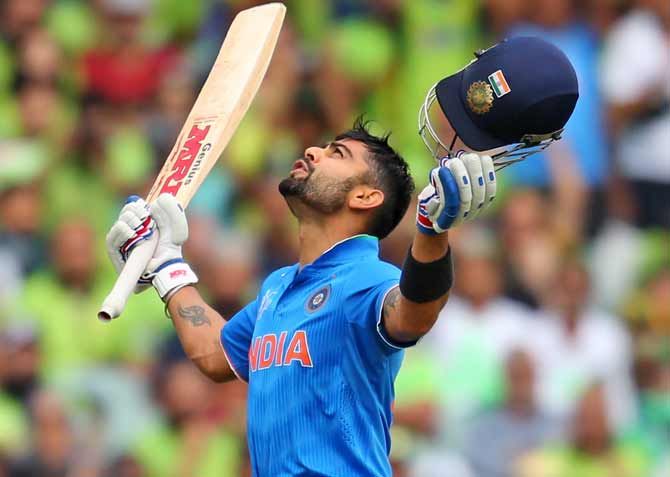
The game was not exactly a humdinger like previous World Cup matches between the arch-rivals, still it had almost everything one could hope for in an India-Pakistan encounter.
41,587 spectators -- predominantly Indians -- were treated to a Virat Kohli masterclass; the man of the match scoring his 22nd ODI century in India's 76-run win over Pakistan.
India did not put a foot wrong after M S Dhoni won the toss and elected to bat. Kohli (107) was the fulcrum around which India's batting revolved.
Pakistan did not do any favours to themselves by dropping him on 3 and 76. Shikhar Dhawan and Suresh Raina chipped in with useful fifties.
Though India could muster only 27 runs in the last 5 overs, losing 5 wickets, the final score of 300/7 was their highest against Pakistan in the World Cup.
Pakistan were never in the hunt.
Mohammed Shami, playing his first World Cup game, started Pakistan's debacle when Younis Khan mis-hooked and was caught by Dhoni.
Misbah-ul Haq then tried to soothe Pakistani nerves by forging useful partnerships, first with Haris Sohail and then with Ahmed Shehzad.
At the end of the 23rd over, Pakistan had scored 101/2. Umesh Yadav then put a spoke in Pakistan's wheel by dismissing Shahzad and Shoaib Maqsood in a space of three balls.
And when Umar Akmal was given caught behind via DRS, Pakistan's innings was in shambles.
Pakistan fans hoped for a miracle from Misbah, but the asking rate became too steep. Misbah top-scored with 76 as Pakistan crumbled for 224 in 47 overs.
Mohammed Shami (4/35) and Mohit Sharma (2/35) were the pick of the Indian bowlers.
All ten dismissals in the Pakistan innings were caught.
The result extended India's record against Pakistan in World Cups to 6-0.